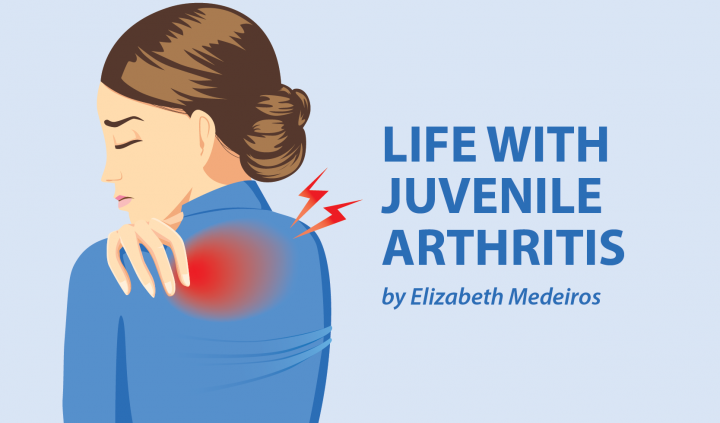Kids with arthritis don’t get the credit they deserve. Not only are they fighting an invisible illness, but also it’s dismissed as an “old person’s disease.” Adding insult to injury, the effects of JA and its treatments can sometimes be visible, and people’s reactions can be less than empathetic.
If only people could see the sheer pain and fatigue. Instead, what they tend to see is facial bloat and acne from oral steroid use, weight gain from medicines and being unable to exercise, severe weight loss from flares and medicine side effects, deformities, psoriasis, and rashes. It’s not fair to go through so much only for the world to judge you on your appearance.
While I think all of these effects can take a toll on one’s mental health, I think weight is a universally sensitive topic for anyone who has juvenile arthritis. Unfortunately, JA tends to cause noticeable weight fluctuations.
Skinny ≠ Healthy
The world judges us on our appearances, and the slimmer, the better. But being skinny is not equal to being healthy. I was at one of my least healthy points when I was taking medicines that stole my appetite. I barely ate for an entire summer and became underweight. Yet everyone thought I looked amazing. It’s sad that a few years later, I still consider losing that amount of weight to receive compliments again.
I’m grateful for my older cousin who didn’t tell me I looked good, but rather that I looked unhealthy. I was relieved because I didn’t feel healthy. I was sad I couldn’t eat, I was cold all the time, I felt weak, and I was so scared. It was miserable. To this day, I’m touched that she could see past the weight loss to how unwell I was.
Bloating, malaise, and depression
Of course, I also dealt with being on the other end of the spectrum. I gained a good amount of weight when I was a young teen. Some of the weight was bloating from medicine, but it mostly came from not feeling well enough to exercise, being depressed, and comfort eating because the side effects made me feel crumby.
From what I was told, I was doing quite well on the treatment I was taking. But I didn’t see the benefits because I felt so uncomfortable in my skin. I only felt worse when I started getting comments about how puffy and round my face looked. I wanted to be invisible. And while I did not deal with this, I know kids with JA are sometimes accused of being “lazy” or “just sitting around and eating all day.” Teens and young adults may even be told their condition will disappear if they just lose some weight. Hearing things like that don’t inspire anyone to make changes — they make you want to hide away.
Words hurt
What we say to young people is important, regardless of their age, body weight, and fitness levels. Toddlers, kids, teenagers, and young adults are all sponges and will take in anything you say, and the damage can last longer than you might imagine. You can still talk to your child and acknowledge their appearance, but as much as possible, keep the focus on looking and feeling healthy.
I think the best way to approach these sensitive topics is to talk about how they are feeling and how they could feel better. For example, if your child is reluctant to exercise, remind them that exercise is for becoming stronger and healthier. I won’t deny that carrying extra weight can make arthritis worse by putting more stress on the joints. But there are plenty of benefits of exercise besides weight loss, including helping the muscles to become stronger, which helps to reduce joint strain. It also reduces fatigue, improves sleep, and keeps stiffness at bay when done in moderation.
For a child going through severe weight gain or loss due to treatments, it’s important to remind them that these issues are not their fault. During these times, it’s essential to focus on their well-being. How is their appetite? Stamina? Are they depressed? Not only are these things way more important than appearances, but they also show your child that your priority is their health.
Wholesome compliments
When you give compliments, do it in genuine ways. Nothing builds confidence more than hearing, “You look so happy.” Praising your child for their talents, strengths, style, and kindness encourages them to focus on who they are, not how they look.
As much as I remember the not-so-great comments, I also remember the compliments I got on my art at that time. That praise helped me to pursue art and become a designer. Words have a huge influence on young people, so use them carefully!
***
Note: Juvenile Arthritis News is strictly a news and information website about the disease. It does not provide medical advice, diagnosis, or treatment. This content is not intended to be a substitute for professional medical advice, diagnosis, or treatment. Always seek the advice of your physician or other qualified health provider with any questions you may have regarding a medical condition. Never disregard professional medical advice or delay in seeking it because of something you have read on this website. The opinions expressed in this column are not those of Juvenile Arthritis News, or its parent company, BioNews Services, and are intended to spark discussion about issues pertaining to juvenile arthritis.

